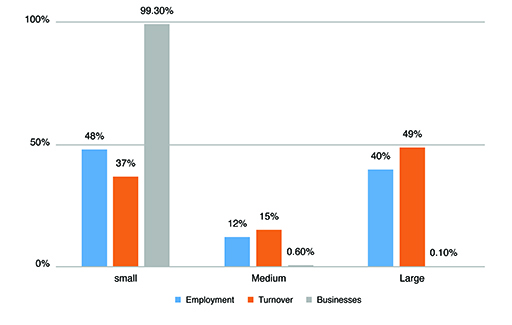2 Business in the UK
Successive governments have identified low productivity in the UK economy and so have provided support to entrepreneurship, new business start-ups and therefore new jobs. In 2020, the government estimated around 6 million businesses in the UK, of which 5.94 million were small (0–49 employees) and 36,100 were medium-sized enterprises (50–249 employees). Only 7,800 businesses were deemed large (BEIS, 2020).
Different definitions of small to medium-sized businesses (SMEs) – which form the vast majority of businessees – exist, but those used by government in the UK differentiate on the basis of turnover and employee numbers. Micro-businesses are considered to be those with fewer than ten employees and a turnover of less than £2m. An SME may have up to 250 employees and a turnover of up to £25m, which in the UK represents over 99 per cent of all businesses (Rhodes, 2017).
As the chart in Figure 2 shows, there are many times more small businesses than there are large ones. UK business angels have continued to invest a similar level to pre-Covid times (British Business Bank, 2020a), though initial investments were a little lower, which accounted for some caution on the economic uncertainty around. Since the pandemic, the UK Business Angels Association (UKBAA) have continued to prioritise proposals from healthcare; biotech, life sciences and pharmaceuticals; and software as a service (British Business Bank, 2020b).
The UK government prioritises financial services, science and technology, energy and health sectors. These are sectors that are particularly important from the perspective of ensuring the security of the economy, as well as being sectors where the UK can be influential. There are many more that are important to the prosperity of the UK, including food and drink, clothing and textiles, and transport. In your own nation, there may be a slightly different emphasis and therefore different opportunities. It is worth checking with the websites of the devolved administrations in Scotland, Wales and Northern Ireland or indeed other countries to see how these differ.
While government priorities do not mean you cannot build a thriving business in another sector, you may find that funding is more readily available in the priority sectors. In Section 6.2 you will find a list of development agencies and support for start-ups in the UK nations and Ireland. These will provide more detail of grants and funding schemes for target sectors.
Large companies account for only 0.1 per cent of businesses, but 40 per cent of employment and almost half (49 per cent) in turnover in the UK. You can perhaps understand how growing businesses are economically important to governments, but that it is much easier said than done. Growing a business for a small enterprise takes much more than working harder and faster.
Next, you will look at what is involved in scaling up to a medium-sized enterprise.

